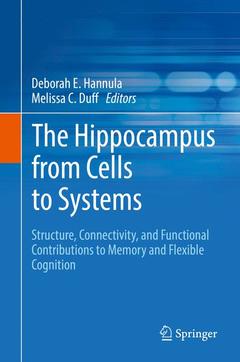Description
The Hippocampus from Cells to Systems, Softcover reprint of the original 1st ed. 2017
Structure, Connectivity, and Functional Contributions to Memory and Flexible Cognition
Coordinators: Hannula Deborah E., Duff Melissa C.
Language: English
Subjects for The Hippocampus from Cells to Systems:
Publication date: 03-2017
Support: Print on demand
Publication date: 05-2018
Support: Print on demand
Description
/li>Contents
/li>Biography
/li>Comment
/li>
The hippocampus has long been considered a critical substrate in the neurobiology, neuropsychology, and cognitive neuroscience of memory. Over the past few decades, a number of ground-breaking theoretical and methodological advances have radically enhanced our understanding of the structure and function of the hippocampus and revolutionized the neuroscientific study of memory. Cutting across disciplines and approaches, these advances offer novel insights into the molecular and cellular structure and physiology of the hippocampus, the role of hippocampus in the formation, (re)consolidation, enhancement, and retrieval of memory across time and development, and permit investigators to address questions about how the hippocampus interacts, functionally and anatomically, with other neural systems in service of memory. In addition, recent investigations also suggest that the mechanistic properties and functional processing features of the hippocampus permit broader contributions to cognition, beyond memory, to the domains of attention, decision-making, language, social cognition, and a variety of other capacities that are critical for flexible cognition and behavior. These advances have profound implications for the neurobiology and cognitive neuroscience of hippocampus dependent cognition and for the numerous psychiatric and neurological diseases and disorders for which hippocampal pathology is a hallmark such as Alzheimer?s disease and schizophrenia.
The goal of this book is to bring together in a single source an integrated review of these advances providing state of the art treatment on the structure and function of the hippocampus. Contributors will examine the hippocampus from a variety of levels (from cells to systems) using a wide range of methods (from neurobiological approaches in non-human animals to neuroimaging and neuropsychological work in humans).
Deborah Hannula is an Associate Professor and the Associate Chair of the Department of Psychology at the University of Wisconsin, Milwaukee.
As the director of the MINDfull of Memory Laboratory, much of Dr. Hannula’s research has focused on contributions made by the hippocampus to working memory and unconscious or implicit expressions of memory. Current work examines interactions between long-term memory and attention with particular focus on questions about whether attention might be captured by long-term memories and the neural substrates that drive these effects. To address research questions in each of these domains, Dr. Hannula’s lab combines eye tracking, functional MRI, and neuropsychological methods. Dr. Hannula has received research funding from the National Institutes of Health and, most recently, was the recipient of a Career Award from the National Science Foundation. She has published nearly 30 articles that examine the basic constructs and neural correlates of learning and memory, and her research was featured recently in the 2015 Edition of the UWM Research Report. For more information about Dr. Hannula’s work, interested parties are invited to visit her lab website: https://sites.google.com/site/mindfulofmemorylab/home
Melissa Duff is an Associate Professor in Hearing and Speech Sciences at Vanderbilt University Medical Center.
Dr. Melissa Duff is the director of the Communication and Memory Laboratory. Her research focuses on the role of the hippocampus in language use and processing, and in flexible cognition more broadly. Methodologically, the lab combines neuropsychological, neuroimaging, and eye-tracking methods together with behavioral methods to address questions about the contribution of memory to various aspects of language and communication, and the dynamic network of neural and cognitive systems that support memory and language in the everyday communicative settings and tasks
This book provides a comprehensive overview of the hippocampus from cells to systems; drawing from neurophysiological, neuroimaging, and neuropsychological research investigations conducted across species. There is no other work, to our knowledge, that brings together in a single source this breadth of coverage of the structure and function of the hippocampus.
The reach of this book extends well beyond traditional views of hippocampal function, highlighting contributions of the hippocampus to flexible cognition in a variety of cognitive domains.
Hannula and Duff have assembled a group of world-class authors who would not otherwise publish in the same circles, providing readers with a one-stop shop to learn about current and interdisciplinary perspectives on hippocampal structure and function.




